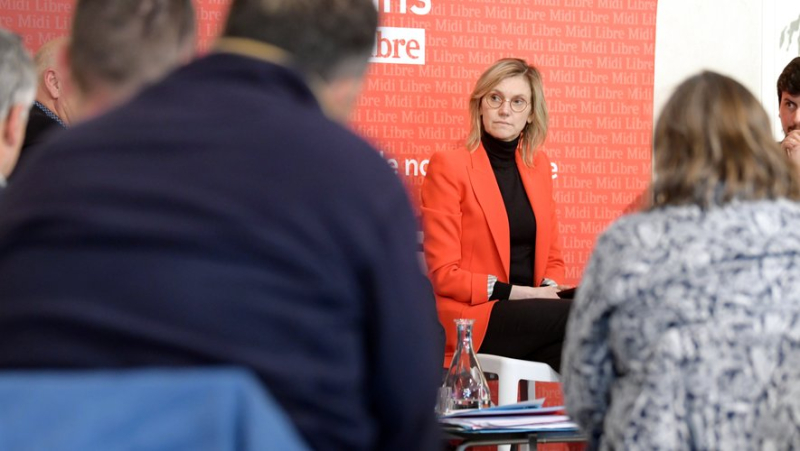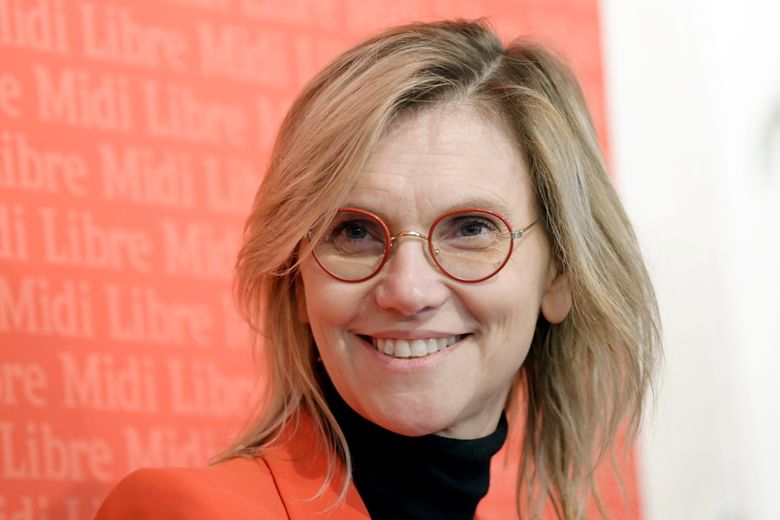Conference on proximity and rurality: Minister Agnès Pannier-Runacher speaking to the readers of Midi Libre

La ministre déléguée à l'agriculture, Agnès Pannier-Runacher, a répondu aux questions des lecteurs de Midi Libre. Midi Libre – Michael Esdourrubailh
Wine crisis, simplifications, income, environmental issues… For more than an hour, Agnès Pannier-Runacher faced around a hundred Midi Libre readers for a rich discussion, as part of our proximity and rurality meetings.
Agnès Pannier-Runacher was eagerly awaited in Lunelois, a very agricultural territory where viticulture, arboriculture and livestock breed the landscapes. Many topics were discussed during an unfiltered discussion with around a hundred readers of Midi Libre.
1- Is the wine crisis resolved??
Right from the start, the minister was questioned about the recent wine crisis. "There are two root causes of this crisis and they are not going to come together. settle next week", began Ms. Panier-Runacher. "It’first is climate change, a major transformation which requires us to look deeper into the way we are going to produce tomorrow, then the war in Ukraine which has been an element of major market destabilization. Farmers have brought forward legitimate needs that we need to address. The 67 commitments made by the President of the Republic must be kept and the agricultural orientation law (debated from May 13) will be one of the answers. But there will also be a law on phytosanitary products, a 2025 finance bill which will include tax and social measures, the Egalim cursor to be reassessed. The challenge is to close this stage of crisis while continuing discussions to get our heads out of the way and secure the agriculture of tomorrow".
2- What phytosanitary policy ?
To a Catalan arborist testifying about the threat to cherry production due to the ban on using a specific phytosanitary product, the minister wanted to be reassuring. "The principle of action, now, is no more prohibition without solution. Rather than doing more than other European countries, we will look culture by culture at what the other Member States have and why we have a gap. And we are going to accelerate research so that innovation can reach farms".
3- Towards a Mediterranean plan ?
Could there be a specific agricultural plan for the Mediterranean rim ? "Rather a Languedoc-Roussillon plan as, in its trajectory, we are& Approaching a desert climate according to scientific classifications with less than 250 mm of water falling on the Pyrénées-Orientales. This is not what we imagined ten years ago", replies the minister. A plan, surely, "but it also implies evolving", she warns, evoking, among other things, work on < em>"sobriety(water consumption), diversifications or even products that adapt to the new taste of consumers, for example on less alcoholic products" ;.

Minister Agnès Pannier-Runacher. Midi Libre – Michael Esdourrubailh
4- On the agriphotovoltaic option
"This is a subject that I share", assured Agnès Pannier-Runacher. To provide additional income, "but priority must always be given to food sovereignty", she specifies. "The installation must first of all allow the plantations to be protected and provide shade. We can produce electricity from September to March and tilt the installation in summer to favor the trees. In Ardèche, we noted a 30% yield gain on cherries and a 30% reduction in water consumption. Another condition for agriphotovoltaism is that it must not cause the price of land to skyrocket.
5- EPZs: "Work to avoid them"
Questioned by the president of the Hérault Chamber of Trades on the constraints generated by low-emission zones which restrict the circulation of vehicles considered to be polluting, Agnès Pannier-Runacher first recalled the ;rsquo;issue : "50 000 premature deaths per year due to air pollution" . The minister therefore called for collective work to be carried out in each metropolis to reduce fine particle emissions. "Some have since been able to release ZFE" devices. At the same time, it calls for "to move forward on soft mobility".
6- Simplification… and constraints
Promise resulting from the recent crisis, the work of simplification is underway, assures the minister. "Each prefect has looked at what measures he can take to drive the first level of simplification. Furthermore, during the public transformation committee, I identified 44 simplification measures when my other ministerial colleagues presented around ten. And this is just the beginning", she said.
Several farmers then testified about the different constraints they face in transferring their farm, housing seasonal workers, building a shed or meeting environmental standards. If Ms. Pannier-Runacher admitted that it is necessary "to facilitate the installation of young farmers and the agricultural orientation law will contribute to this", she defended the fact "that we cannot do everything everywhere, such as authorizing an installation in a flood zone". According to her, all the same, the prefect "must be the level of adaptation to the specificities of the territory". A rich debate which closed the discussion.
I subscribe to read more




